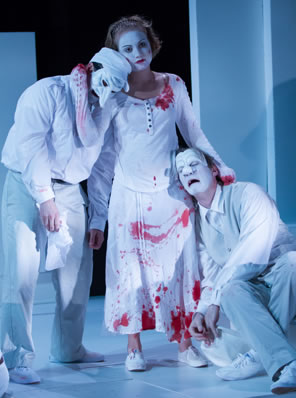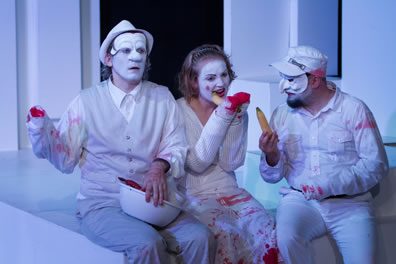Titus Andronicus
Shakespeare's Gorefest Gets
The Commedia Treatment
Faction of Fools Theatre Company, Elstad Annex, Gallaudet University, Washington, D.C.
Friday, May 30, 2014, Third row, center
Directed by Matthew R. Wilson
Comedy attains genius status as two guys set about mutilating and raping a woman.
Stay with me here.

Lavinia (Miranda Medugno) consoles Titus (Nello Deblasio, left) and Marcus (Toby Mulford) in the Faction of Fools production of Titus Andronicus. Photo by Teresa Wood, Faction of Fools.
This is Titus Andronicus, William Shakespeare's gorefest. And this is the Faction of Fools, practitioners of commedia dell'arte. That's a lethal combination, and I mean that in the theatrical sense: this production kills.
So, Chiron and Demetrius, sons of Goth Queen Tamora, and with her encouragement and coaching, set about raping Lavinia, Titus Andronicus's daughter, after they have killed her husband. In Shakespeare's script, the sons also cut out Lavinia's tongue and chop off her hands so she can't report the deed, all of which takes place off stage. This production starts the action on stage as Chiron (Tyler Herman) pulls on Lavinia's tongue. It's a long tongue; Chiron pulls at least three feet's worth before he slices it off with his knife. Silly stuff. However, Lavinia is played by Deaf actress Miranda Medugno, and Demetrius by Deaf actor Charlie Ainsworth who now, using American Sign Language (ASL), points out to Chiron that Lavinia doesn't use her tongue to speak. Oh, right! is this Chiron's reaction, and so he slices off Lavinia's hands and blood squirts forth from her stumps.
Thus, amid the mayhem slips through a joke accessible to those who know ASL or who are paying close attention to the details as the scene unfolds. It is such combinations of visual silliness and intelligent humor, its broadly comic scenes full of clever details, that make this Titus Andronicus a screamer of both the comic and horror variety. It's also great Shakespeare, to boot.
Being upstaged by stage business is the standard for actors in this production. As Titus (Nello Deblasio) and his brother Marcus (Toby Mulford) argue on one side of the stage, Titus's sons carry their brother, whom their father has just slain, across the stage, leaving a trail of dripping blood. When in the play Titus has his own hand cut off to save the lives of his two sons wrongly accused in the murder of Lavinia's husband, in this production his brother and eldest son, Lucius, also lop off their hands, and you end up watching a pas de trois of slippery severed hands. The salvation of the sons turns out to be a cruel joke, so in come their decapitated heads in bloody sacks, which the messenger accidently drops with a sickening thud on the stage floor. The four hand-lopped Andronici—including Lavinia—try to pick up the heads while holding their severed hands, and you have heads dropping on toes and being kicked around on the blood-slicked floor. Make sure you return early from the intermission to see Titus, Marcus, and Lavinia at their picnic, with oranges and bananas they can't peel, jars of candy they can't open, and a lobster in its shell. In the climactic banquet scene, Titus delivers to Tamora the pie made from her sons in a box similar to the kind used by a nearby pie store—a local institution, and though the store's name, Dangerously Delicious Pies, isn't featured on the box, much of the audience gets the joke. In the ensuing massacre, a fork, a spatula, and a whisk along with knives are used to stab people, and the emperor Saturninus (Daniel Flint) is strangled with his own intestines.
There's a lot of adjectives you can apply to this production: ridiculously gory, hilariously sick, ingeniously gruesome, and, of course, OMG bloody. How bloody is it? Faction of Fools held a "blood drive" for this production, a fund-raising campaign to pay for all the blood of different varieties needed for the play's three-week run (blood that squirts, blood that splatters, blood that pools, blood that tastes good). How bloody is it? The multiplatform stage (designed by Ethan Sinnott) is all white, representing a pristine Rome for the play's setting, and costume designer Denise Umland dresses the actors in all white, including white-clown makeup and white commedia dell'arte masks (designed by Aaron Cromie—even Aaron the Moor's baby wears a miniature commedia mask); by the end of the two-hour show, pink and red have become the predominant hue of stage and clothes. How bloody is it? The program lists Casey Kaleba as co-choreographer and blood effects. Yes, the blood gets its own choreographer.
So, yeah, if you are sensitive to excessive violence, gore, sexism, jokes at the expense of people with disabilities, and rambunctiously silly Shakespeare, you might consider avoiding this production. But, consider, too, that Titus Andronicus is itself violent, gory, sexist, racist, and, frankly, rambunctiously silly. Consider, too, that the violence in the production currently playing at Shakespeare's Globe in London is reported to be so realistic people are becoming physically ill watching it; here, the full-house audience in the 94-seat Estad Annex at Gallaudet University doubles over, as well, but it's with laughter.
Oh, and as for that sensitivity for traditional Shakespeare you might harbor, here is another adjective fitting this production: thoroughly Shakespearean. Let's take a quick detour into scholarship for a moment. The Italian Renaissance theatrical form known as commedia dell'arte reached London by the 1560s, and scholars see evidence of its influence in Shakespeare's early plays. Titus Andronicus is one of his earliest. In this play, Shakespeare takes the revenge tragedy form of Thomas Kyd's Spanish Tragedy and the villainous alien attributes of Aaron from Christopher Marlow's The Jew of Malta, both hugely popular plays at the time, and pushes them beyond the bounds of common sense. I mean, chopping off your hand to save your sons? Forcing your handless and tongueless daughter to carry your severed hand in her mouth? Grinding your enemy's sons' bones into a pastry for a pie that will contain their heads that you serve to your enemy? That's all pretty extreme, even by 1590 standards. Yet, Shakespeare draws his characters to be so very human, albeit on a grandiloquent scale, he makes the villain the most heroic character in the play, and he shows the Romans to be as barbaric as the Goths. So, what kind of mirror was Shakespeare holding up to his Elizabethan London audiences?
Perhaps the same kind of mirror that commedia dell'arte troupes held up to their audiences in the streets and courtyards of Renaissance Italy, their masked, stock characters improvising their way through over-the-top comic skits with in-your-face morality and a subtle vein of serious satire or social conscience running through the performances. Faction of Fools Founding Artistic Director Matthew R. Wilson is a master of the arte-form, having taught it in Italy, and his D.C.–based company has expertly presented this form over the past five years, including two Shakespeare adaptations: A Commedia Romeo and Juliet (now touring to area schools) and Hamlecchino, Clown Prince of Denmark. The former clearly showed how Shakespeare could have incorporated commedia dell'arte into the play's structure; less so with the Hamlet makeover, but even that production provided new insights into certain characters and some scenes.
Wilson, who directed Commedia Romeo and Juliet and Hamlecchino (in which he also played the title role) as well as this Titus Andronicus, is well studied in Shakespeare. What's key to his direction is that he brings that Shakespearean knowledge to his productions through the prism of commedia dell'arte. He assigns stock types to each character (Titus is Pantalone, Marcus is Dottore, Tamora is Signora, Lavinia is Innamorata, Aaron and all of Tamora's sons are Zannis, Lucius and the rest of Titus's sons are Capitanos), but the influence in this production is more about masks and makeup than personality. Rather, the characters generally hold true to Shakespeare's portrayals. Wilson has added to Shakespeare's script the severed hands of Marcus and Lucius for comic effect, and he has perhaps heightened the gore factor elsewhere, too; or, perhaps not—we'll never know for sure. Yet, we do see how Titus Andronicus makes more sense as slapstick comedy than earnest tragedy while maintaining its central humanity.

From left, Marcus (Toby Mulford), Lavinia (Miranda Medugno), and Titus (Nello Deblasio) attempt to eat bananas, which they can't peel with their stumps instead of hands in the Faction of Fools production of Titus Andronicus. Photo by Teresa Wood, Faction of Fools.
One scene in particular illustrates this, when first Marcus and then Titus discover the mutilated Lavinia. Both men engage in long, masterly written rhetoric on grief, giving actors playing these parts the opportunity to pour on and pour out their verse-speaking skills. But what of Lavinia? She has to put up with more than 130 lines of Titus and Marcus wailing and woeing, and she is the real victim here. "We see the senselessness of violence—whether in warfare, sibling rivalries, or revenge—and we see the egocentric callousness with which people ignore survivors because they are too consumed with their own grief," writes Wilson in his program notes. And so, Medugno's Lavinia soon leaves off expressing her own woe and, wearing a Buster Keaton stone-faced expression, waits out her dad and uncle carrying on. Finally, with her stumps, she disinterestedly tries to console them.
Wilson gives credit where it's due; in conversation after the show, he told me this reading emerged from Medugno herself during her audition. In an all-in ensemble featuring intentionally stereotyped, hamming performances (in addition to those mentioned already, notice goes to the lithe-hipped Manu Kumasi for his overly-sexualized Aaron), Medugno emerges as a true star. She plays the innocent, romantically sweet Innamorata at the start, presents true horror during her mutilation despite the scene being played for laughs, and continues her deadpan performance the rest of the way with impeccable comic timing, whether she's trying to pick up her brother's head and kicking it instead, waving Marcus goodbye with Titus's hand in her mouth, watching Young Lucius open the jar of candy and then closing it up again without giving her any, or realizing Titus is about to kill her for the most obtuse of reasons at the play's climax. She reveals her assailants by writing their names with a stick dipped in a pool of blood (an alteration from the text, in which she carves out the letters in sand), stays on stage after the rest of her family leaves, and with her stumps smears the bloody names. The whole while she is alone she wears a vacant-soul look, expressing in her eyes not only the intense hurt she's endured but also the years of wracked living she thinks she has ahead of her.
"There is nothing funny about murder or rape, but there is something absurd about the culture of violence and patriarchy that produces these atrocities," Wilson writes in his program notes. This lesson comes home in the production's final image. After the massacre that the banquet becomes, Young Lucius is left on stage, as is Aaron's baby, who begins to cry. Young Lucius picks up the infant boy, looks puzzlingly at it, removes the fork from dead Titus's head, and stabs it into the baby. As the crying stops, Young Lucius looks at the audience with a gleeful laugh—much as we had been doing watching senseless violence for the previous two hours.
Yes, you may never see a funnier production of any Shakespeare play than Faction of Fools' Titus Andronicus—talk about a comedy of errors—but you'll still have to face up to the grinning specter that is your reflection.
Eric Minton
June 4, 2014
Comment: e-mail [email protected]
Start a discussion in the Bardroom



 Find additional Shakespeareances
Find additional Shakespeareances